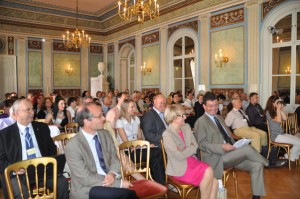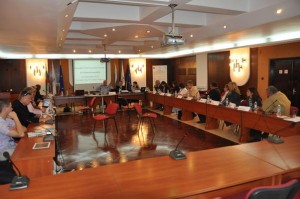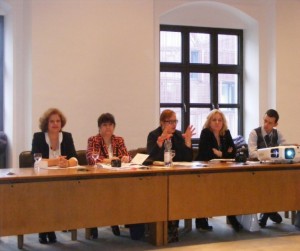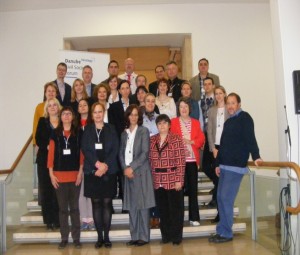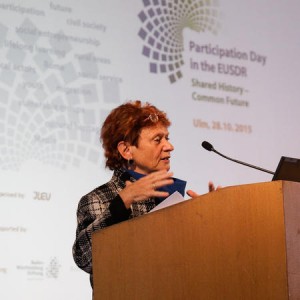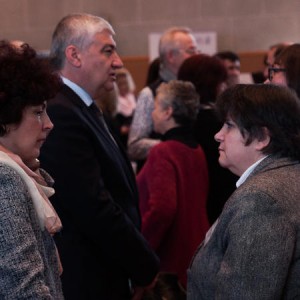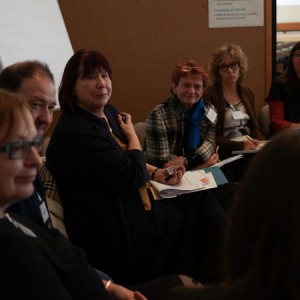The Danube Civil Society Forum (DCSF) was founded on 1 July 2011 at the first general conference with more than 100 participants. It is open to civil society active in non-profit and non-partisan organisations as well as academics (one representative per NGO) from the Danube Region (Germany, Austria, Hungary, Czech Republic, Slovak Republic, Slovenia, Romania, Bulgaria and Croatia, Serbia, Bosnia and Herzegovina, Montenegro, Ukraine and Moldova). The DCSF is the platform for civil society dialogue and networking in the Danube basin under the EU Strategy for the Danube Region (EUSDR). It functions as the interface for structured consultations between civil society and public and private authorities on the regional, national and EU level as well as to international and intergovernmental organisations active in the region. While the DCSF acted in close cooperation and in consensus with the responsible EU institutions, the Danube Civil Society Forum is a self-organized and independent NGO structure. The Forum is registered under the Austrian law. The objectives of the Danube Civil Society Forum are: To support and promote the Danube Strategy following the principles of respect for democracy and human rights, the rule of law, good governance, principles of market economy and social and environmental sustainable development; To support the existing non-governmental organizations, the creation of independent and autonomous non-governmental organizations, to strengthen the capacity of civil society and to support, assist and coordinate the efforts of its members; To promote a culture of dialogue and cooperation between civil society organizations and between civil society and public and private actors in the Danube Basin; To promote dialogue and solidarity between peoples and cultures.
In order to achieve its objectives, the DCSF: Holds a regular general assembly (The Danube Civil Society Forum) at least every second year; Cooperates with all public or private, international or regional institutions whose activities are related to the objectives of the DCSF; Launches relevant research and documentation activities; The resources of the Danube Civil Society Forum shall be made up of contributions by its members and any other resources allowed under the law. The working language of the Danube Civil Society Forum is English.
Brief History
First General Assembly of the Danube Civil Society Forum – Opening Session
The Danube Civil Society Forum held its first General Assembly on 30 June – 1 July, at the Esterházy Castle in Eisenstadt, Austria. More than 100 NGO representatives and guests from all 14 participating countries convened to establish the DCSF.
Danuta Hübner, MEP, addressed the DCSF General Assembly with her opening speech.
With the unanimous adoption of the statutes the Danube Civil Society was founded. Subsequently the executive committee was elected: President: Stefan August Lütgenau, Foster Europe, Austria; Vice President: Daniela Stojkovic Jovannovic, World and Danube, Serbia; Treasurer: Igor Studennikov, Centre of Regional Studies, Ukraine; Chair WG 1: Tiahana Stepinac Fabijanic, ECOVAST, Croatia; Chair WG 2: Irene Lucius, WWF DCPO, Austria; Chair WG 3: Carmen Stadelhofer, ZAWiW, Germany.
2nd General Assembly of the Danube Civil Society Forum, 25 September 2013 Ruse, Bulgaria DCSF members on the 2nd GA
Due to its statutes the DCSF convened its 2nd General Assembly on the 25th September 2013, in Ruse. The assembly was opened by the Deputy Mayor of Ruse, Mr. Strahil Karapchanski and by Stefan August Lütgenau, president of the DCSF. In the Frame of the General Assembly the Forum commissioned the EC to: organise the working groups, in coordination with the chairs, to meet as soon as possible; discuss membership fees; convene WG4; safeguard external funding for the DCSF; foster and enhance intern communication; discuss participation to Danube Festival Ulm, 3td – 13th of July.
Before the General Assembly, in September 2013 the Danube Civil Society Forum was registered under the Austrian law. In order to acknowledge the registration slight amendments in the Statutes were necessary. These changes were accepted by the EC unanimously.
3rd General Assembly of the DCSF
Participants in the 3rd General Assembly of the DCSF
The 3rd General Assembly of the DCSF was held on 27th of October 2015 in Ulm, Germany. 30 members of the Danube Civil Society Forum and 1 observer took part at the official meeting which gathers every second year due to the laws of the Forum. The event was opened by Ivo Gönner Lordmayor of Ulm. The 3rd General Assembly heart the reports by the president and the treasurer, as well as from the Executive Committee, debated the work plan for the upcoming two years (2016/17), decided on pending membership applications and amend the statutes upon suggestion by the Executive Committee, and last but not least elected the Executive Committee members, Treasurer and Vice Treasurer President and Vice President for a two year term. Stefan August Lütgenau, President presented his Report 2014/15 “Stagnation and Progress“
Stagnation: No third-party financing has been identified so far beyond the co-funding for 1stand 2nd Participation Day and the Danube River Show. DCSF is mainly sponsored by Foster Europe; DCSF needed financial resources: First, the minimum costs app. € 32.000 per year to organize two Executive Committee Meetings, General Assembly, and to further fund the DCSF Website and Working Group/s. Second, the approximate costs € 94.500-200.000 per year to run a fully functioning office including the costs for above mentioned events, for support of four Working Groups, for office rent, for communication strategy, and for consultation; DCSF was involved in 8 European Union project applications, none of them were accepted; Foster Europe, successful applicant in the EU project LADDER. This project will partially finance the 3rd Participation Day of the EUSDR.
Progress: Institutionalized D-LAP Platform under PA10 of the EUSDR; Website danubestrategy.eu: runs online and is being actively updated. The registration, information sharing of the 2nd Participation Day and the 3rd Participation Day is done on the website platform.
Carmen Stadelhofer, Executive Committee Member and Chairperson of Working Group III “Building Prosperity in the Danube Region” (Knowledge, Education, Invest in People and Skills) reported from two projects. One successfully closed receiving European reward, second ongoing “Bread, Wine and Herbs”, in which she welcomes all interested organizations. Ms. Stadelhofer reported on the Qualification Training, offered by DANET, with the aim to strengthen civil society collaboration in Europe by capacity building. She calls for more participation and more action from the side of the DCSF members.
Daniela Stojkovic Jovannovic invited all members applying for the membership to present themselves to the DCSF plenary: Farm Development Foundation represented by Veselina Pelagic; Council of Danube Cities and Regions represented by Peter Langer; Citizen Participation Forum-The Bulgarian Network for Citizen Participation represented by Iva Taralezhkova; Danube Area Research Center (DAReC) represented by Aleksandar M. Gajić; Gábor Schneider, external expert researcher; Association of Germans and Austrians Vukovar represented by Dara Mayer; The Association theWriters` League Timisoara represented by Ana Zlibut.
After the elections the actual member organisations are: Agency for sustainable development of the Carpathian region, UA; Association of Germans and Austrians Vukovar, HR; Centre for Regional Studies, UA; Citizen Participation Forum-The Bulgarian Network for Citizen Participation, BG; Council of Danube Cities and Regions, DE; Danube Area Research Center (DAReC), RS; Eco center, center for socio-ecological research and documentation, RS; ECOVAST, EN; Farm development foundation, RS; FORZA, UA; Foster Europe Foundation for strong European Regions, AT; Fundatia Ecologica Romana, RO; IARDI, UA; Centre for Regional Studies, UA; ILEU, DE; Institute for resarch and Developement of Education, SI; Institute of Public Strategies, UA; Law & Democracy, RO; National Center for Injury Prevention and Safety Promotion, RS; NGO World and Danube, RS; Slovenian Third Age University, SI; State University of Library Studies and Information Technology, BG; The Association “The Writers` League” Timisoara Banat Branch, RS; University of Ruse, BG; WWF Danube-Carpathian Programme, AT; ZAVOD CEKTRA – Centre for Knowledge Transfer, SI; ZAWiW, DE.
In the end of 3rd General Assembly of the DCSF the following candidates were elected: President: Stefan August Lütgenau; Vice President: Daniela Stojkovic, Treasurer: Igor Studennikov, Vice Treasure: Gábor Schneider, Executive Committee: Iva Taralezhkova, Irene Lucius, Carmen Stadelhofer, Simon Vreca.
Perspectives
The Danube Civil Society Forum (DCSF) will continue to be the platform for civil society dialogue and networking in the Danube basin under the EU Strategy for the Danube Region (EUSDR). It will function as the interface for structured consultations between civil society and public and private authorities on the regional, national and EU level as well as to international and intergovernmental organisations active in the region. The DCSF will mainly work in four working groups formed along the four pillars of the EUSDR, “Connecting the Danube Region”, Protecting the environment in the Danube Region”, “Building Prosperity in the Danube Region” and “Strengthening the Danube Region”. As all four thematic areas follow an interdisciplinary/multidisciplinary and comprehensive approach, the DCSF emphasis its policy to mainstream its key principles, the respect for democracy and human rights, the rule of law, good governance, the principles of market economy, social and environmental sustainable development, the principles of ethnic and gender equality as well as the principle of regional balance throughout the entire structure and activities of the forum. In order to enable civil society to network on focused issues of trans-regional importance each working group may establish sub-working groups along special thematic or regional areas i.e.: biodiversity, the Danube delta or life-long learning. These working groups and sub-working groups will be the greenhouses of networking, cooperation and innovation in the DCSF.
Bulgarian representatives Assoc. Prof. Emiliya Velikova, PhD (University of Ruse) and Assoc. Prof. Mariela Nankova, PhD (SULSIT) will continue to work in WG 3, with Chairperson Mrs. Carmen Stadelhofer.
Conclutions
The Danube Civil Society Forum will continue to act as interface to public and private authorities on the regional, national and EU level as well as to international and intergovernmental organisations active in the region. It is one of the few truly European and transnational actors in the Danube region promoting and shaping the idea of European Integration and the concept of the Danube Strategy. Due to the nature of NGO work and civil society and their constituency, the DCSF implements a bottom-up approach with strongest links to the grass. The DCSF should contribute to the objectives of the DS by: enriching the governmental track of the DS by providing a civil society perspective, notably through the regular provision of recommendations (input/evaluation/ monitoring of the work of the DS), including input in the work of ministerial meetings and multilateral platforms; promoting dialogue between CSOs, networking and exchange of experience & best practices with other groupings (EESC, social partners, NGOs, think tanks etc.), working on the issues of common interest linked to the goals of the DS; sharing experience in the European integration processes in DS countries; discussing what civil society can do to promote the macro-regional component of the DS, including confidence building measures and post-conflict management in the region; building capacity of civil society organisations in the countries of the DS through the contacts with CSOs from EU MS and international organisations/networks; providing an open channel for permanent inclusion of civil society expertise and views in the DS; facilitating relations with the EU institutions; contributing, via the Civil Society Forum, to the strengthening of national civil societies and CSOs dialogues with authorities in the EU member states (EU MS) and the DS partner countries; advising the annual revison and evaluation of the DS from a CSO perspective, strengthening institutional capacity building role of CSOs, especially in those sectors where they have valuable know-how and can contribute to achieving.
Building on the Eisenstadt Declaration on Participation in the EU Danube Strategy of 25 June 2014 the 2nd Participation Day in Ulm is held to further foster Civil society participation in the EUSDR and safeguard that necessary processes and structures are established on all levels (regional, national, supra-national) in the EUSDR.
Mrs. Carmen Stadelhofer
Participants from DANET in the 2nd Participation Day
The presented 3rd draft of the resolution for the 2nd Participation Day is aiming to achieve these common goals. Thematic issues will be addressed by the 10 thematic workshops held at the Participation Day in Ulm. The 2nd draft was edited and amended by an Intervention regarding the Refugee Crisis in Europe.
Resources:
- http://dcsf.danubestrategy.eu/
- http://www.foster-europe.org/en/news/danube-civil-society-forum-eu-strategy-danube-region
- http://www.mrrb.government.bg/docs/e770d7b1046d1d4cb0a54d05911a26f4.pdf
- http://ec.europa.eu/regional_policy/archive/consultation/danube/doc/contrib/eur_fostereurope_concept.pdf
- http://www.danubecat.at/danube-civil-society-forum/
- https://www.linkedin.com/pulse/news-danube-civil-society-forum-daniela-stojkovic?trkSplashRedir=true&forceNoSplash=true
- http://d5267.ispservices.at/
- https://www.euagenda.eu/2015/10/27/Danube-Civil-Society-Forum-3rd-General-Assembly
- http://dcsf.danubestrategy.eu/sites/default/files/Media/DCSF%203rd%20General%20Assembly%20Resolution%20Minutes%2027%20October%202015.pdf
- https://en.danube-networkers.eu/meeting-of-workgroup-3-of-danube-civil-society-forum-dscf-in-belgrade-in-july-201/
Assoc. Prof. Mariela Nankova, PhD
State University of Library Studies and Information Technologies, Sofia, Bulgaria

